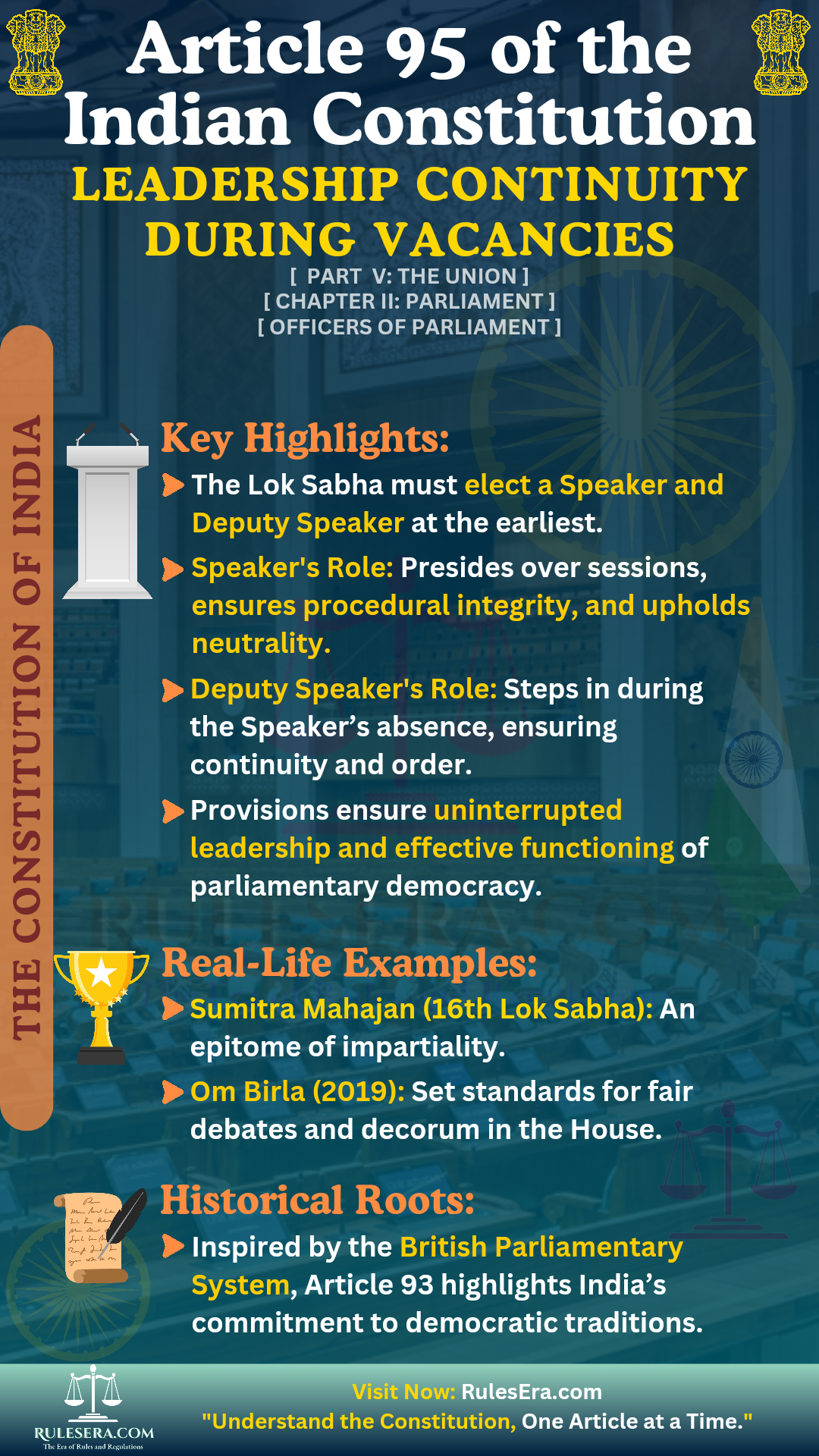Part V: The Union
Chapter I: The Executive
The Parliament
Article 95: Power of the Deputy Speaker or other person to perform the duties of the office of, or to act as, Speaker

--- Original Article ---
A member holding office as Speaker or Deputy Speaker of the House of the People—
- (1) While the office of Speaker is vacant, the duties of the office shall be performed by the Deputy Speaker or, if the office of Deputy Speaker is also vacant, by such member of the House of the People as the President may appoint for the purpose.
- (2) During the absence of the Speaker from any sitting of the House of the People the Deputy Speaker or, if he is also absent, such person as may be determined by the rules of procedure of the House, or, if no such person is present, such other person as may be determined by the House, shall act as Speaker.
Explanations
Article 95 of the Constitution of India establishes clear guidelines for instances when the Speaker of the Lok Sabha is either absent or when the position of Speaker is vacant. It ensures that the duties of the Speaker are delegated to the Deputy Speaker or another member of the House appointed by the President or determined by the House, ensuring the smooth functioning of parliamentary proceedings.
Clause-by-Clause Breakdown
- Clause (1): Performing Duties When the Office of the Speaker is Vacant
Clause (1) of Article 95 specifies that if the office of the Speaker is vacant, the Deputy Speaker is automatically tasked with performing the duties of the Speaker. In cases where both the Speaker and the Deputy Speaker positions are vacant, the President is empowered to appoint a member of the Lok Sabha to assume the role of Speaker temporarily. This provision is critical for maintaining the orderly conduct of parliamentary affairs and avoiding any leadership vacuum that may arise due to sudden vacancies. - Clause (2): Acting as Speaker in the Absence of the Speaker
Clause (2) outlines what happens when the Speaker is absent from any sitting of the Lok Sabha. In such cases, the Deputy Speaker steps in to fulfill the duties of the Speaker. Should the Deputy Speaker also be absent, the rules of procedure of the House come into play to determine who will act as the Speaker. In situations where no pre-designated person is present, the House itself determines who will perform the Speaker’s duties for that session.
Real-Life Examples
- Example: An example of this provision being invoked occurred after the tragic death of Speaker G.M.C. Balayogi in 2002. The office of the Speaker was vacant, and Deputy Speaker P.M. Sayeed took over as the acting Speaker. During this period, he oversaw the smooth operation of the Lok Sabha until a new Speaker was elected. This example underscores the importance of Article 95 in providing continuity during unforeseen circumstances.
- Example: In 2019, during the absence of Speaker Om Birla from a sitting of the Lok Sabha, Deputy Speaker Thambidurai stepped in to act as the Speaker. The seamless transition of authority ensured that parliamentary sessions continued without any hindrance, illustrating the effectiveness of Article 95 in maintaining legislative order even in the Speaker’s absence.
Historical Significance
The office of the Speaker in India draws from British parliamentary traditions, where a clear delegation of duties exists in the absence or vacancy of the Speaker. The framers of the Indian Constitution, inspired by this tradition, incorporated similar provisions into Article 95 to prevent disruptions in parliamentary proceedings. The role of the Deputy Speaker and the mechanisms for appointing a temporary Speaker reflect the emphasis on maintaining the efficiency and integrity of the Lok Sabha.
Legislative History
Article 95 of the Indian Constitution, initially drafted and debated as article 78 of the Draft Constitution, was subsequently incorporated into the Indian Constitution on May 19, 1949.
Debates and Amendments
Since no amendments were proposed and discussions were minimal during the introduction of this article, the Constituent Assembly adopted it as originally drafted into the Indian Constitution.